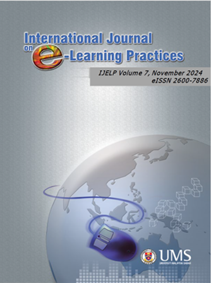ENHANCING ESL LEARNERS READING COMPREHENSION AND MOTIVATION VIA AI-GENERATED PERSONALISED READING TEXTS
DOI:
https://doi.org/10.51200/ijelp.v7i1.5440Keywords:
AI-generated reading texts, ChatGPT, personalised learning, reading comprehension, reading motivationAbstract
This study identifies the effect of AI-generated personalised reading texts on ESL learners’ reading comprehension and motivation at the secondary school level in Sabah, Malaysia. Drawing on the research of Jendia and Ismail (2023), the current study extends the exploration of AI’s potential in tailoring reading materials to cater to individual learner needs. Conducted with 20 students from SMK Desa Kencana, Lahad Datu, the study employed a mixed-methods approach that incorporates both quantitative (pre-assessment and post-assessment scores) and qualitative (open-ended questions) data. The findings reveal significant improvements in reading comprehension, specifically among low and intermediate-proficiency groups. Advanced learners, however, failed to show maximal gains from the intervention which suggests the need for materials challenging materials yet suitable for higher proficiency levels. The intervention’s effectiveness is due to the personalised and engaging nature of the AI-generated texts, which enhanced learners’ motivation and engagement. Qualitative feedback obtained from the students also indicates the relevance of the personalised materials in the classroom. Despite the positive outcomes, limitations such as small sample size, external factors, and convenience sampling that may affect the generalizability of data are recognized. The study concludes with practical and theoretical implications, recommending integrating AI-based personalised materials in ESL education to support differentiated instruction and meet diverse learning needs. Future research should consider more extensive yet diverse samples and control for external variables to validate and broaden these findings.
References
Ariani, D. W. (2019). Basic psychological needs as predictors of burnout and engagement. Journal of Psychological and Educational Research JPER – 2019. 27(2). 51-74 http://www.marianjournals.com/files/JPER_articles/JPER_27_2_2019/Ariani_JPER_20 19_27_2_51_74.pdf
Bojorquez, H. & Vega, M. M. (2023). The Importance of Artificial Intelligence in Education for All Students. IDRA Newsletter. 1(5). p 1-7. ISSN 1069-5672
Boucher, P. (2020). Artificial intelligence: How does it work, why does it matter, and what can we do about it? EPRS | European Parliamentary Research Service. 1-64. ISBN: 978-92-846-6770-3, doi: 10.2861/44572
Butterfuss, R., Kim, J. & Kendeou, P. (2020). Reading Comprehension. Oxford Research Encyclopedia, Education (oxfordre.com/education). (c) Oxford University Press USA, 2020. DOI: 10.1093/acrefore/9780190264093.013.865
Chapelle, C. A., et al. (2020). Revisiting Learner Autonomy in Language Learning: Conceptualization, Dynamics, and Assessment. Language Learning & Technology, 24(2). 1–21.
Cheng, F. L. (2019). Reading Comprehension of ESL Students in Mainland China. Journal of Adolescent & Adult Literacy, 62(1), 55–65. https://doi.org/10.1002/jaal.878
Darmayanti, N. P. E. (2021). The Effect of Visualized Reading Content on Students’ Reading Motivation. The Art of Teaching English as a Foreign Language. 2(2). 78-83. DOI:10.36663/tatefl.v2i2.120
Field, A. (2016). Discovering statistics using IBM SPSS statistics (5th ed.). Sage Publications.
Guay, F. (2022). Applying Self-DeterminationTheory to Education:Regulations Types, Psychological Needs, and Autonomy Supporting Behaviors, Canadian Journal of School
Psychology. 37(1). 75–92. DOI: 10.1177/08295735211055355
Guthrie, J. T., et al. (2020). Engaging Adolescents in Reading: A Social Cognitive Analysis with Implications for Instruction. Routledge.
Jendia, J. & Ismail, H. H. (2022). Developing Personalised Reading Materials forMalaysian Primary School Pupils Using ChatGPT: A Review. International Journal of Academic
Research In Business And Social Sciences. 13(12). E-ISSN: 2222- 6990 © 2023
Joulide, S., Faravani, A. & Boori, A. (2020). Conjuring up the correspondence of high-school students’ self-determination and classroom climate with reading achievement. English Language Teaching Educational Journal. 3(3). pp. 198-210. ISSN 2621-6485
Kaya, E. (2015). The Role of Reading Skills on Reading Comprehension Ability of Turkish EFL Students. ÜNİVERSİTEPARK Bülten. 4. 37-51. 10.12973/unibulletin.412.4.
Kim, M. H., & Choi, H.-J. (2021). A Study on the Use of Artificial Intelligence in English Language Teaching and Learning. Journal of Language and Cultural Education, 9(3), 249–267. https://doi.org/10.29333/jolace.v9i3.1264






